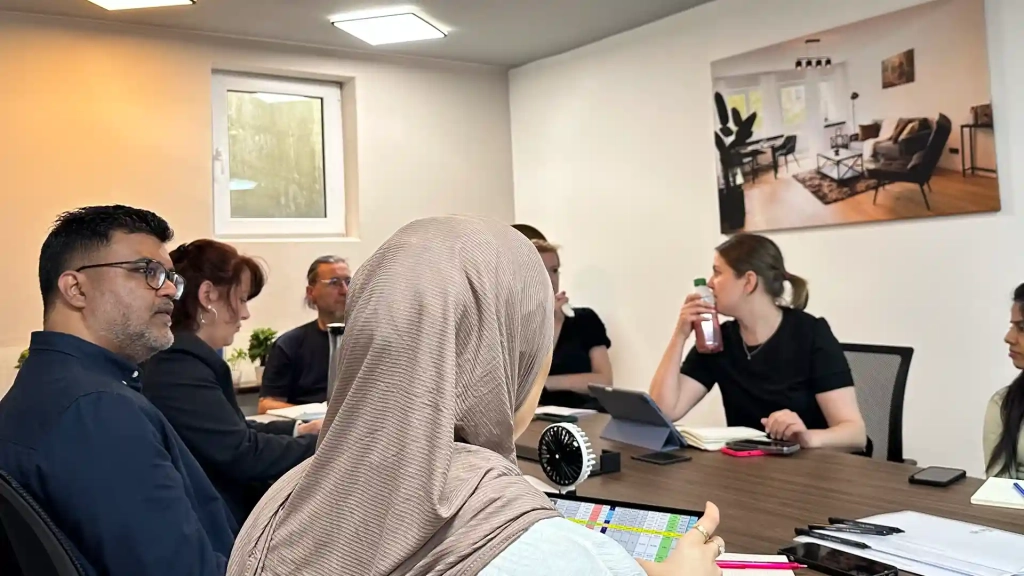What German Work Culture Shock Looks Like for Expats – My Story as an Indian Professional in Berlin
- What German Work Culture Shock Looks Like for Expats – My Story as an Indian Professional in Berlin
- Becoming a Tenant at KUMMUNI – Where Things Felt Different
- Joining KUMMUNI – The Culture Shock That Surprised Me
- German Work Habits vs. What I Knew from India
- Seeing German Workplaces Through a B2B Lens
- My Thoughts
From Student to Worker – My First Job in Germany
When I first came to Berlin as an international student, I never imagined the path my career would take. Like many newcomers, I had to start small.
My first real working experience here was at an Amazon warehouse. Long night shifts, sorting packages, strict schedules. It was tough, but it was honest work, and it gave me my first real taste of the German way of doing things — rules, precision, and an almost clockwork operation.
After some time, I was fortunate enough to land a job in a small company related to the tourism industry.
The environment there was much more relaxed compared to the warehouse. People were creative, friendly enough, and I genuinely learned a lot. The company believed in giving space for ideas, and my time there helped me understand German work ethics from a different angle — how quality and responsibility are non-negotiable.
Even though social life with colleagues was still limited, the work culture was healthy, and I will always be thankful for that phase of my journey.
Becoming a Tenant at KUMMUNI – Where Things Felt Different
While I was still in India preparing for my move to Berlin, I faced the usual struggles every newcomer knows — unanswered rental applications, unclear requirements, and a general feeling that getting a place without already being in Germany was almost impossible.
That’s when I discovered KUMMUNI.
I applied for a room while still abroad. To my surprise, everything was straightforward. I received clear communication, no unnecessary questions about my background, and no awkward doubts about my situation. The process was professional from start to finish.
What impressed me most was the real commitment to zero discrimination — something I later realized is still quite rare in the German housing market.
Even before setting foot in Berlin, I already felt respected.
After moving in, I could see how fast KUMMUNI was developing. Every few months, something improved — better apartments, smarter processes, more sustainable practices. Watching this steady growth, it became clear to me that this was not just a housing company; it was a project with real purpose.
And from those early days as a tenant, I knew I wanted to be part of it, not just as a resident, but as someone contributing to its journey.
Joining KUMMUNI – The Culture Shock That Surprised Me
When the opportunity came to join KUMMUNI, it felt natural.
I already trusted the company because of my experience as a tenant. I knew it was not just talk — it was real.
Even though I had already worked in Germany, joining KUMMUNI gave me a new kind of culture shock — one that was positive, but different.
Here, after every face-to-face meeting, phone call, or online chat, a written protocol must be sent.
Initially, I thought, “Is this really necessary?” — coming from India, we often handle things verbally, trusting memory and mutual understanding.
But over time, I saw the value.
There is no confusion later. Every decision, every point agreed upon, is recorded. Things move faster because no one wastes time re-discussing old topics. It’s a kind of bureaucracy, yes, but it serves clarity and efficiency, not just formality.
Similarly, regular written work reports are mandatory.
At first, I felt it was extra paperwork. But now I know, it keeps everyone aligned, makes progress visible, and protects both the employee and the company from misunderstandings.
German Work Habits vs. What I Knew from India
Comparing the working styles, I can say German work culture is highly structured.
People are focused, independent, and respect boundaries — both physical and emotional.
In India, work culture is fast, sometimes chaotic, but more expressive and flexible. Decisions happen faster, but sometimes too fast without enough documentation.
Here, I learned the beauty of planning and precision — even if it felt a bit stiff in the beginning.
At KUMMUNI, however, it is a blend.
There is German structure, but the heart of the team is international — and that gives it energy, diversity, and humanity.
What My Friends Experience in Other German Workplaces
I have many Indian, Middle Eastern, and even European friends working across Berlin in different companies.
Most of them tell me the same thing — their workplaces are formal to the point of feeling mechanical. People come in, do their work, and leave. There is no real bonding. Colleagues are colleagues, not friends. Small talk ends after “hello.”
It made me realize how lucky I am.
At KUMMUNI, mornings start with jokes, smiles, and real interaction.
Here, people show up early not because they are afraid, but because they care.
Here, people stay longer if needed, without being forced.
Many times when I hear stories from my friends, I ask myself —
“But where is the fun in that?”
Because honestly, you work for fun too.
Of course, money is important. It puts food on the table. It pays the bills.
But what is money worth if you don’t enjoy what you do or where you work?
From Business Owner to Team Member – What I Miss and What I Gained
Before coming to Germany, I used to run my own business back in India.
Being your own boss has a different taste — you can make decisions fast, change strategies overnight, take risks without asking anyone.
Sometimes, I do miss that freedom — the ability to act purely on instinct.
But what I have found at KUMMUNI is something equally valuable: a fair, honest, and supportive environment.

Here, nobody judges you based on your background.
Here, ideas are heard. Hard work is noticed.
And for me, being part of something that grows sustainably, treats people with respect, and builds community is a kind of success that goes beyond personal profits.
Seeing German Workplaces Through a B2B Lens
Today, I am working as the Head of B2B Account Management at KUMMUNI.
In this role, I interact with many other German companies — partners, service providers, clients.
Through these interactions, I see a pattern — many German companies are extremely formal, extremely rigid.
Emails are serious, meetings are structured, and there is little space for spontaneity.
And again, I ask myself:
“But where is the fun in that?”
Work is not just about ticking boxes. It’s about energy, passion, and people.
That’s something I am proud to say exists at KUMMUNI — and something that keeps me motivated every day.
My Thoughts
Working in Germany can be a culture shock.
Yes, there is structure.
Yes, there is formality.
But at the right company, there can also be warmth, opportunity, and growth.
At KUMMUNI, I have found the best balance:
German efficiency, international energy, and human connection.
From tenant to team member, from student to manager — my journey has been anything but ordinary.
And I wouldn’t have it any other way.
How informative was this article?
Click on a star to rate it!
We are sorry that this post was not useful for you!
Let us improve this post!
What is missing in the article?















